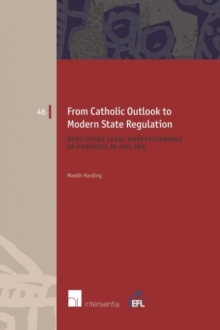
Cross-Border Recognition of Formalized Same-Sex Relationships : The Role of Ordre Public Paperback / softback
by Laima Vaige, Katharina Boele-Woelki
Part of the European Family Law series
Paperback / softback
Description
Same-sex relationships have successively qualified for formalization through marriage or registered partnership in many European countries.
However, some EU Member States still refuse to give them any form of recognition or only allow very limited legal effects.
The irregular speed of development in domestic family laws in EU Member States results in limping family relations, that is, family relations that are recognised as creating a formal civil status in many EU Member States, but not in all of them.
The ordre public safeguard of private international law has widely been used to justify why a same-sex marriage or registered partnership cannot be recognised.
The pretext tends to be that national identity, allegedly, becomes threatened.
Nevertheless, the case-law of the European Court of Human Rights and the Court of Justice of European Union provides new standards for recognition, which create legal obligations for EU Member States.
The author focuses on the interaction between human rights standards and private international law, carrying out a deft investigation of the impact of Europeanization on this interaction, analysing legal effects of same-sex marriages and registered partnerships in the Baltic States and Poland in a cross-border context.
The central theme in this book is the elusive and ever-changing concept of ordre public, and the interplay between its understanding(s) at the national and European levels.The aim of this book is to evaluate the impact of culture in this area of study, within the context of the analysed States recent histories, societal developments, and religions.
This book is published at a time of clashes between traditional family values and gender equality in Europe.
In States like Lithuania and Poland, the heterosexual nature of marriage is considered to be a fundamental component of the States national identity and public policy.
Nevertheless, the book reveals how different legal understandings of national identity, ordre public, and the family can co-exist in parallel.
Information
-
Out of Stock - We are unable to provide an estimated availability date for this product
- Format:Paperback / softback
- Pages:524 pages
- Publisher:Intersentia Ltd
- Publication Date:10/09/2022
- Category:
- ISBN:9781839702563
Information
-
Out of Stock - We are unable to provide an estimated availability date for this product
- Format:Paperback / softback
- Pages:524 pages
- Publisher:Intersentia Ltd
- Publication Date:10/09/2022
- Category:
- ISBN:9781839702563










